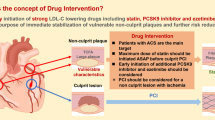Abstract
Aspirin has been tested for its benefit in preventing cardiovascular disease in randomized trials in three categories of patients. In secondary prevention among those with a history of myocardial infarction (MI), stroke or transient cerebral ischemia, or unstable angina pectoris, 25 randomized trials demonstrated significant reductions from aspirin of 25% for the occurrence of an “important vascular event” (nonfatal MI, nonfatal stroke, or vascular death), 32% for nonfatal MI, 27% for nonfatal stroke, and 15% for vascular mortality. Among those evolving an MI, the Second International Study of Infarct Survival (ISIS-2) showed a significant reduction of 23% in five-week vascular mortality among those started on a one-month regimen of daily aspirin within 24 hours of the onset of symptoms of suspected MI. Aspirin also significantly reduced reinfarction, nonfatal stroke, and important vascular events. Finally, in primary prevention, the US Physicians’ Health Study (PHS) showed a significant 44% reduction in the occurrence of a first MI among apparently healthy male physicians; numbers of strokes and vascular deaths were insufficient to permit conclusions for these endpoints. Thus, aspirin is of clear benefit in reducing MI, stroke, and vascular death in secondary prevention and among those evolving an MI. It is also beneficial in the primary prevention of MI among men over 40, but data concerning its effects on stroke and vascular death remain inconclusive.
Similar content being viewed by others
References
Moncada S, Vane JR. Arachidonic acid metabolites and the interactions between platelets and blood-vessel walls. N Engl J Med. 1979;300:1142–7.
Hennekens CH, Karlson LA, Rosner B. A case-control study of regular aspirin use and coronary deaths. Circulation. 1978;58:35–8.
Hammond EC, Garfinkel L. Aspirin and coronary heart disease: findings of a prospective study. Br Med J. 1975;2:269.
Hennekens CH, Buring JE. Epidemiology in medicine. Boston: Little, Brown, 1987.
Anti-Platelet Trialists Collaboration. Secondary prevention of vascular disease by prolonged antiplatelet therapy. Br Med J. 1988;296:320–31.
UK-TIA Study Group. United Kingdom transient ischaemic attack (UK-TIA) aspirin trial interim results. Br Med J. 1988;296:316–20.
ISIS-2 (Second International Study of Infarct Survival) Collaborative Group. Randomized trial of intravenous streptokinase, oral aspirin, both, or neither among 17, 187 cases of suspected acute myocardial infarction: ISIS-2. Lancet. 1988;II:349–59.
Steering Committee of the Physicians’ Health Study Research Group. Preliminary Report: Findings from the aspirin component of the ongoing Physicians’ Health Study. N Engl J Med. 1988;318:262–4.
Peto R, Gray R, Collins R, et al. A randomised trial of the effects of prophylactic daily aspirin among male British doctors. Br Med J. 1988;296:313–6.
Steering Committee of the Physicians’ Health Study Research Group. Final report on the aspirin component of the ongoing Physicians’ Health Study. N Engl J Med. 1989;321:129–35.
Hennekens CH, Peto R, Hutchison GB, Doll R. An overview of the British and American aspirin studies. N Engl J Med. 1988;318:923–4.
Report of the U.S. Preventive Services Task Force. Clinical Guide to Preventive Services. US Department of Health and Human Services, 1989.
Peto R, Yusuf S, Collins R. Cholesterol-lowering trial results in their epidemiologic context. Circulation. 1985;72(suppl III):451.
Hebert PR, Fiebach NH, Eberlein KA, Taylor JO, Hennekens CH. The community-based randomized trials of pharmacologic treatment of mild-to-moderate hypertension. Am J Epidemiol. 1988;127:581–90.
Collins R, Peto R, MacMahon S, et al. Effects of drug treatment for hypertension on the risks of stroke and of coronary heart disease: evidence from an overview of randomised controlled trials considered in the context of observational epidemiology. Lancet. 1990;335:827–38.
Hennekens CH, Buring JE, Mayrent S. Smoking, aging and coronary heart disease. In: Bosse R, ed. Smoking and aging. Lexington, MA: D. C. Heath, 1984.
Hennekens CH, Buring JE, Sandercook P, Collins R, Peto R. Aspirin in the secondary and primary prevention of cardiovascular diseases. Circulation. 1989;80:749–56.
Author information
Authors and Affiliations
Additional information
Received from the Departments of Medicine and Preventive Medicine, Harvard Medical School and Brigham and Women’s Hospital, Boston, Massachusetts.
Rights and permissions
About this article
Cite this article
Buring, J.E., Hennekens, C.H. Prevention of cardiovascular disease. J Gen Intern Med 5 (Suppl 2), S54–S57 (1990). https://doi.org/10.1007/BF02600843
Issue Date:
DOI: https://doi.org/10.1007/BF02600843




